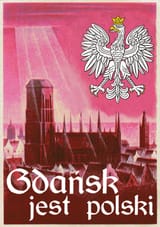Anonymous
ID: tjJOdPKA
6/30/2025, 3:16:53 PM No.509123521
>The city has a complex history, having had periods of Polish, German and self rule. Originating as a Slavic fort within Poland since 997, it has been an important shipbuilding and trade port since the Middle Ages, while between 1361 and 1500 it was a member of the Hanseatic League, which influenced its economic, demographic and urban landscape. It served as Poland's principal seaport and was its largest city from the 15th century until Warsaw surpassed it in the 18th century. With the Partitions of Poland, the city was annexed by Prussia in 1793, and became a part of the German Empire in 1871. In 1807–1814 and 1920–1939 it was a free city. On 1 September 1939 it was the scene of a military clash at Westerplatte, one of the first which initiated World War II. The contemporary city was shaped by extensive border changes, expulsions and new settlement after 1945. In the 1980s, Gdańsk was the birthplace of the Polish Solidarity movement, which majorly contributed to the Fall of Communism in 1989 and the dissolution of the Warsaw Pact.
Replies:
